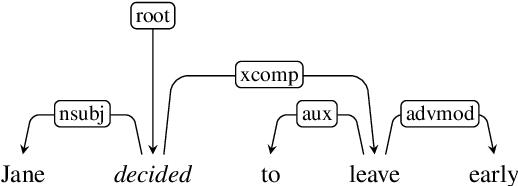Aspectuality Across Genre: A Distributional Semantics Approach
Paper and Code
Oct 31, 2020



The interpretation of the lexical aspect of verbs in English plays a crucial role for recognizing textual entailment and learning discourse-level inferences. We show that two elementary dimensions of aspectual class, states vs. events, and telic vs. atelic events, can be modelled effectively with distributional semantics. We find that a verb's local context is most indicative of its aspectual class, and demonstrate that closed class words tend to be stronger discriminating contexts than content words. Our approach outperforms previous work on three datasets. Lastly, we contribute a dataset of human--human conversations annotated with lexical aspect and present experiments that show the correlation of telicity with genre and discourse goals.
 Add to Chrome
Add to Chrome Add to Firefox
Add to Firefox Add to Edge
Add to Edge